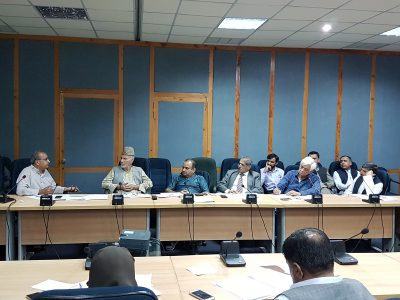
The Pakistan Institute of Parliamentary Services held an interactive Post Budget Seminar for the honorable parliamentarians on Friday, 2nd June, 2017. The session was held at the Parliamentary Resource Centre, Parliament Lodges and honorable parliamentarians from both houses, Senate and National Assembly, were invited for the event. The programme included three keynote speeches by the following facilitators: Dr. Waseem Shahid Malik, Dr. Athar Maqsood Ahmed and Mr. Nohman Ishtiaq.
The session began with introductory remarks by Director Research and I.T PIPS, Mr. Rashid Mafzool Zaka, in which he thanked the honorable parliamentarians, experts and worthy facilitators for taking out the time to attend the seminar. After the recitation of the verses from the Holy Quran, the Executive Director, PIPS, Mr. Zafarullah Khan gave his welcome remarks. He welcomed the parliamentarians and thanked the facilitators on agreeing to share their knowledge. Mr. Zafarullah pointed out two things which lack attention in the budget: firstly, there is less talk about formalizing Pakistan’s massive informal sector and secondly, he mentioned that supplementary grants need to be approved by the Parliament as other expenditures. Around 35 people including Eight Hon MNAs and Senators keenly participated in the seminar.
The first keynote speaker of the evening was Dr. Waseem Shahid Malik who spoke on the State of Pakistan’s Economy in the Context of the Annual Budget. He focused on the macroeconomic aspects and challenges of Pakistan along with possible threats and solutions. He pointed out that a good budget stimulates growth. For economists, budget is more than mere numbers and it must be linked with growth in order to impact state affairs on a grand scale. He stressed that as a nation we must: stop ignoring risks, strengthen social safety nets, focus on long term growth instead of short term stabilization policies, develop appropriate tax reforms, set nonvolatile macroeconomic targets and match our economic growth rate with our population growth rate.
The second keynote speaker was Dr. Athar Maqsood Ahmed who spoke on the salient features of the Budget and Finance Bill 2017. Dr. Athar highlighted various areas which need to be addressed in order to stimulate positive economic growth. These include: tax policies, public sector enterprises, trade deficit, power theft and distribution, governance and security concerns. He pointed out that Pakistan has to make some major considerations when it comes to its fiscal policy and harness an environment which encourages savings and investments in industry. Furthermore, he mentioned that we need to focus on unconventional things and indulge in making technologically advanced products. He concluded by mentioning the positive agricultural intervention being brought in by CPEC, but also stressed on making the necessary arrangements to counter the environmental threat that may result from the industrial projects.
The final speaker of the evening was Mr. Nohman Ishtiaq who spoke on the MP’s role in the Post Budget Process. He began by giving a brief explanation of the entire budgetary process: the timeline, the breakup and the constitutional budget documents. He emphasized that in the case of Pakistan, much like most third world nations, budget is built on politics rather than economic evidence. He pointed out that accountability is the domain of the MPs as democracy is all about checks and balances. Moreover, he mentioned that a two week span is not enough to discuss the budget in good detail; in most healthy democracies the minimum time set for this task is 60 days. He concluded by pointing out the need to maintain assets and focus on service delivery.
The speeches were followed by a thorough question and answer session in which the facilitators responded to the various concerns of the honorable parliamentarians. The honorable parliamentarians requested Executive Director, PIPS, Mr. Zafarullah Khan to continue having such informative sessions throughout the year, building the knowledge base of the parliamentarians to make their budget related discussions in the Parliament more meaningful and effective.
The seminar concluded with remarks by the Executive Director.